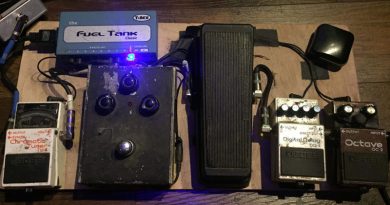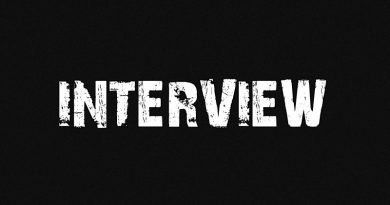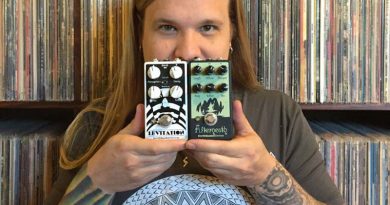In Search Of Tone: Scott & Jon Of Kowloon Walled City
Kowloon Walled City are signed to one of my all-time favorite record labels, Neurot Recordings. With bands like Neurosis, US Christmas, Amenra it was a no brainer to check out Kowloon Walled City. They immediately grabbed my attention and have had it since. I needed to learn as much as I could about their incredible music and luckily Scott Evans and Jon Howell were kind enough to sit down with me for a chat.
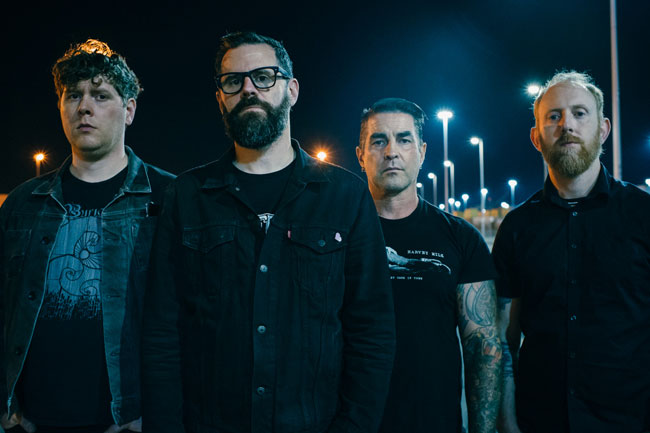
I learned quite a bit from these two, from the detailed workings of boost pedals to a unique way to deal with my many off days and even a new book I need to read. Their music alone is inspiring to me and that only increased after I had this amazing opportunity to talk with them both. I have been playing a lot more than fifteen minutes a day now!
Thank you both for taking the time to discuss the incredible music of Kowloon Walled City. I think you guys create songs that flow flawlessly and that’s something I struggle with. When I create a riff or small idea, I’m never satisfied with it and end up not liking it. I can never decide that it’s an ok riff to keep.
Scott: That’s because it’s not. The secret is to keep changing it forever and never be satisfied [laughs].
Oh perfect, so I’m on the right path then!
Scott: Yeah, you got it.
Awesome [laughs]. What is your songwriting process like? Does it change from album to album?
Jon: About halfway through Grievances, Scott and I started writing a little bit differently than we had before. Previously it included everybody in the room. We would bring in ideas and flesh everything out with all four of us together. About halfway through Grievances we started writing in Scott’s studio because he has a great setup. We can plug directly into his program. Also, all of Piecework was written with Scott and I together in his studio. It’s been pretty productive even though it’s a slower process, but slow is fine as long as we get something good out of it.
Scott: There are some bands that have songwriters where people bring an entire song, but in our case, we are a team of song assemblers. I don’t think there’s a song on this new record where one of us wrote the whole thing. I could definitely point out that this is a Jon section, or this is Scott section, but throughout we’re throwing ideas at each other and completing the arrangement. There’s a bunch of what Jon and I did do together but a lot more happens when we’re in the room with the other guys, we’re all really dialed in with the music that we’re trying to create.
There are some bands that have songwriters where people bring an entire song, but in our case, we are a team of song assemblers…
The idea is Jon and I start working together prior to get past the ‘why don’t you move your fingers up one fret’ and try that and all the little details that no one wants to sit through. We come up with a general idea, bring it to the other guys and we can flesh it all out together. The whole is better than the sum of the parts. I would definitely say if Jon or I were to write entire songs individually and bring it to the band I don’t think they would come out nearly as well as they do when we do things together as a whole.
The other thing is relentless editing. We record everything that we play when we’re together. I’ve got a couple of mics set up in our practice space and we can listen back and talk about it. I send the recording from practice to the guys and we can listen back and discuss. Just so that everything we do can be productive
When you mention editing are you talking more about the mixing and mastering aspect?
Scott: No, this is all still songwriting. For example, if the guitar part doesn’t lift the way it should, or we need a transition that sets up the next section of the song, or this part is boring, or this part is great, more of that. Some bands bring in a few riffs and more riffs as they practice and then put all those riffs together to create a song. That’s not how we work.
I appreciate that about your band. The music flows seamlessly between heavy distortion and smooth clean soundscapes. I love it.
Scott: The trick is years of agonizing [laughs].
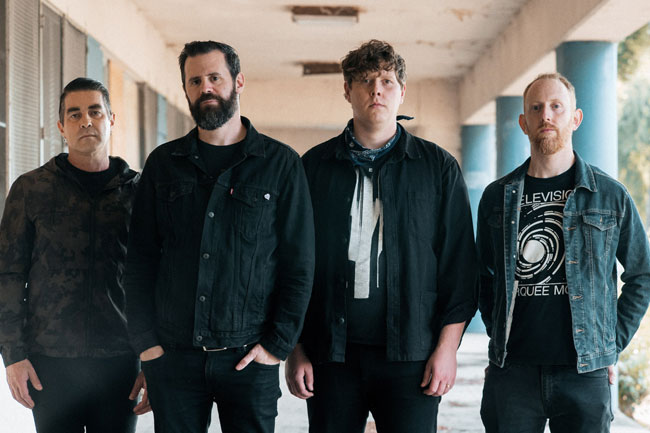
What do you do if you’re having an off day?
Scott: [laughs] I just call those days.
Jon: [laughs] I know what I’d say here but I know Scott has a different answer. For me, I try to write through my off times. Now, I don’t have to come up with lyrics, I don’t do vocals, let me say that right off the bat. I’m just coming up with guitar parts and I actually try and write through off days because even if it sucks, it’s also possible that it won’t and I think it’s good to develop the discipline to write no matter what. To write through all situations because it’s not magic writing music it’s work. Jason Isbell had a great quote about this actually, and it’s about how there’s no such thing as an ‘off day’. It’s not your job to be inspired, it’s your job to write, so just write. You have to go to work on days that you don’t want to work. If you’re a writer and you’re serious about it, you just keep going, there’s no such thing as an off day. Scott’s looking up the actual quote I see.
Scott: Found it! ‘My job is to write, not to like what I’m writing. That’s why we edit, and nobody gets editor’s block’.
That’s powerful. I’ve done many interviews asking this question and most answers are ‘take the day off’, or something along those lines. This is one of the rare times where I’m hearing to push through and keep writing.
Scott: There’s a really good interview that Jon sent me from the podcast Noise Feed with Duane Denison and he talks a lot about his guitar discipline. The numbers he throws up casually about how much he plays guitar every day are remarkable. I never really thought about it as a kid. I assumed that the bands I love are geniuses and this music just came out of them, but in fact they had incredible work ethics and worked their asses off. This is true for graphic designers, illustrators, welders, whatever you’re into, the work is needed to hone that craft.
Josh: I guess my fifteen minutes a day of playing isn’t as much as I thought it was [laughs].
Scott: Well, it’s fifteen minutes more than I do [laughs]. Jon is right and my answer is different, I tend to put the guitar down and if I have plenty of other things I need to do, I’ll just go and do them.
we were playing Hi-Tone’s that are really beautifully built modern Hiwatt clones…
I guess maybe a combination of both answers is what’s needed to keep moving forward. Moving onto gear, what amps are you guys using?
Scott: It’s a funny story because in our band we’ve tried to create rules for ourselves. Consistent rules and live by them. We could have infinite options in the room while writing, but we really try and limit ourselves. Consistency is important. That being said, Jon and I (Jason and I before Jon joined) have not used the same rigs on any record. It’s always one guitar, two to three pedals, and one amp on every record, but the combination of those changes every record. On Piecework, the amps are gone already [laughs]. I’m still questioning that Jon.
Jon: [laughs] Yeah, it was the right move though and I’m trying to remember, we were both playing the same amp right?
Scott: Yes, we were playing Hi-Tone’s that are really beautifully built modern Hiwatt clones. They’re built to meticulously clone those Hiwatt’s. Have you ever played a Hiwatt?
Josh: No, I really want to at some point.
Scott: I’ve played a lot of amps and I’ve never played one like a Hiwatt, they’re remarkable and extremely clean, ton of headroom and they’re unforgiving but they still somehow feel like the tube amps, you might say ‘oh that’s a solid state amp’, it’s not. We try to balance that ‘always on’ gritty clean tone and then at times a more burly tone. I feel Jon and I found that was hard to deal with on the Hi-Tone’s. We always had to have a pedal on because the Hi-Tone’s are too clean to get that gritty tone without pedals. This is something coming from us, they’re incredibly loud. We’ve always been a loud band, but with those, we thought ‘OK, these are ludicrous’. Those are gone now but they were the Hi-Tone DR103 and we were both playing them with a couple of pedals. You were playing all boost pedals right Jon?
Jon: Yes, all boost pedals and a single delay. Should we get into what we’re doing now, is it worth mentioning?
Scott: That doesn’t matter [laughs].
Jon: I know it’s going to change [laughs]. I’m in another band with Ian Miller, the bass player, and our band practice is in LA. While we were in LA, I was borrowing someone’s amp which was a Vox AC30. I have maybe played one before, but I haven’t really messed around with them too much. I plugged in at rehearsal and immediately thought this is incredible. The thing that Scott was describing before, we have this slightly pushed gritty clean sound that we’re able to really burl it out when necessary, the Vox was able to immediately get that pushed gritty clean sound with very little knob tweaking. I want to keep messing around with it, but I wanted something a little more stable. The Vox is known to blow up, so I sold the Hiwatt and bought a Matchless DC-30, which is the clone of the Vox AC30, and when Scott heard it he’s like ‘oh that’s the one’, and he went out and got the Bad Cat version which is slightly hotter. Now we’re both playing Vox clones which is weird but sounds fantastic.
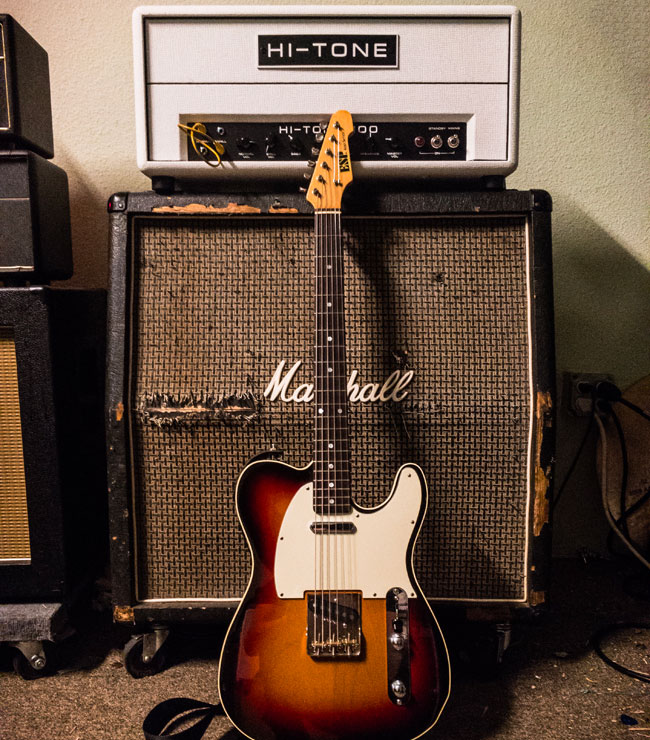
One question I wrote down is how you got that clean tone specifically in Splicing, it’s interesting you mentioned searching for the gritty clean tone in the amps.
Scott: For Splicing, I think we may have redone that song. The simple answer is we were using the Hi-Tone’s with whatever boost we had turned way down. I had a Hudson Broadcast pedal which is a really beautiful sounding sort of mild overdrive. It’s the kind of pedal you can use real gently to get that mild push. Jon was doing something similar. It’s not quite guitar into amp, but it’s not much beyond that.
I have a small set-up for guitar, I have a few pedals and a small Orange Micro Dark amp. I’ve never really used a boost pedal but I’m hearing a lot more about them. I’m now even more intrigued knowing how much you’ve used them.
Scott: There are two ideas for the boost. With your Micro Dark, that thing has a ton of gain, so you don’t really need to push that unless you want to get it super saturated. For us it’s different. Basically, it’s trying to get your guitar louder into the preamp to break it up a little bit. In Jon’s case, it’s like 40 DB of gain or something crazy, really pounding the shit out of the amp. We were both playing Electronic Audio Experiment pedals called the µ Blaster, it’s a cool flexible boost. It does make things louder, but it’s also got a lot of tone to it. The gain is very gentle, and it also has this knob on the bottom that at 10:30 or 11 o’clock the low end is flat, below that it starts cutting the low-end and above that it boosts it.
Another flavor of a boost is treble boost. Some people back in the day used that for a lead tone to really pop out. The treble boost thing is kind of cool if you’re running into gain because it pulls out some lower end. Lower end causes amps to sound squishy because low end takes a lot of energy to reproduce. You can sometimes cut some of that going into the preamp, then boost it after in the power section of the amp. Back in the day that was a really common trick for people that played tight chugs riffs. We don’t want tight chugs, but we do tune really low, and we still want that sparkly clean sound, so it’s nice to have, especially if you’re using a borrowed amp.
We were both playing Electronic Audio Experiment pedals called the µ Blaster, it’s a cool flexible boost…
Thank you for that information, it was very helpful. Speaking of tuning, what do you guys typically tune your guitars to?
Jon: C standard with drop A#. Basically, drop D tuning two steps lower and we know a couple of people that play lower than that which is absurd to us [laughs]. It’s interesting because there are challenges to playing that low. Scott said we’re playing that low but we’re not playing chugging riffs. That’s not the goal of playing that low, so between the way Scott and I play, set up our guitars and strings that we use, there are little challenges that we’re trying to overcome.
Scott: You think it’s challenging?
Jon: I think the tuning issues are challenging and I used to play an older vintage guitar which sounds incredible. I still have it, but I was never able to really nail the tuning of it. The main challenge that Scott and I would come across would be when we’re playing live, and the tuning stability of my guitar would be off on that lowest A# string. When Scott and I would hit that note together, which we do often, it would be off just enough that it would cause a problem.
Scott: Fair enough, we have done that and look at each other across the stage like what just happened [laughs].
Jon: [laughs] We’ve done that on stage in front of people but ultimately, it’s an interesting challenge and to write with those challenges then be able to perform everything and pull it off is difficult. There are little things going on at all times.
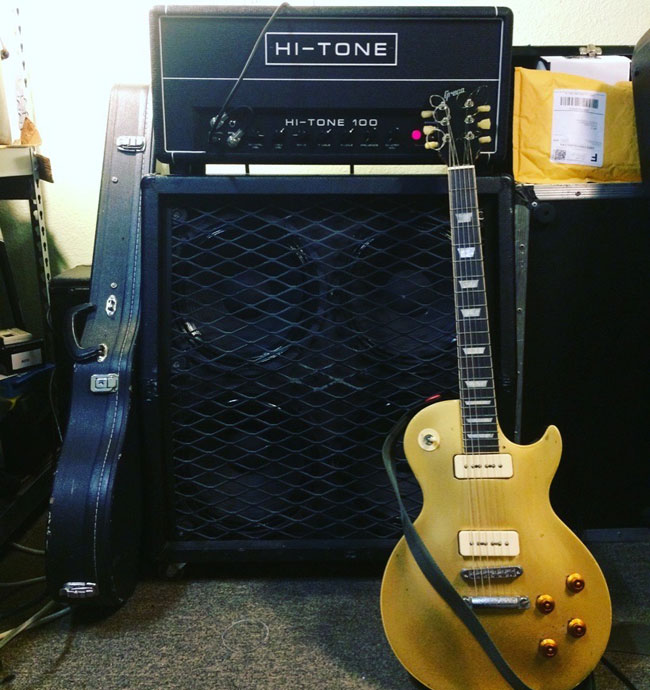
That makes sense, I’ve tried tuning down to A and it doesn’t even register a noise, it’s just a floppy string [laughs]. What guitars are you guys currently playing?
Scott: I’m playing an old late 80s/early 90s ESP 400 Series Telecaster, it’s fucking awesome and if anybody reading this has one for sale, please contact me immediately. It’s just a really really great guitar. I played an Edwards Les Paul for ten years, which is also an ESP build, and every time I pick it up it’s still fantastic. I switched to a Telecaster on this record to get used to the longer scale length and more brightness of it, it’s awesome. Jon, you’re playing the gold top on this record right?
Jon: That’s correct. For Container Ships, Grievances, and Piecework, I was playing the same the 1978 Greco Les Paul. I don’t know if you’re familiar with the Japanese lawsuit deal.
I’ve heard about it.
Jon: A number of companies, including early Ibanez, early Fernandez, and others made their bones cloning pretty exact replicas of Gibson and Fender models. I don’t think this is the case anymore, but for a while, you could get a guitar made in the late 70s and early 80s, they were fantastic quality it would be a quarter as expensive. Often the real thing, if it’s in your price range, wouldn’t be a great model. I used a ‘78 Greco Les Paul gold top with P90s in it and I still have it.
Scott: It’s a great guitar.
Jon: It really is a great guitar. I mentioned earlier the tuning stability and when you play old guitars it’s just that they’re old. Somewhere along the line, I got the idea of making a Stratocaster work in this band and it’s been a glorious struggle [laughs]. I made it work and it sounds really great. Don’t shake your head Scott [laughs]. In 2015, Fender put out a series of limited runs of special models and one was a 1970s style Hardtail Stratocaster and they’re just excellent. I actually bought two of them for a decent price and they sound great. Some of the problems the older Greco guitars had, these newer Stratocaster‘s solved and I also don’t feel anything if I drop one, where I would definitely feel something if I dropped the Greco.
I’m playing an old late 80s/early 90s ESP 400 Series Telecaster, it’s fucking awesome and if anybody reading this has one for sale, please contact me immediately…
I love P90 pickups. I just bought an Epiphone Casino with P90s and it’s fantastic. I think I prefer single coil pickups to humbuckers.
Scott: We have been using single coils for three records now. There’s something about them they just sound fast and transparent, and it makes things mean in a certain way, maybe it’s because I grew up hearing only humbuckers or something.
That’s cool. I guess I just assumed heavy music was made using humbuckers, but it’s interesting how I’m finding single coils are used a lot more often.
Scott: I think of Kurt Ballou often, who is playing Rickenbacker through whatever amps he had at the time, and you definitely wouldn’t expect him to play that in a band that was that heavy, but also, he had those frenetic weird guitar tones that were great. He’s the one that I think of immediately, but I remember seeing pictures of Cave In back in the day and they’re playing all Hiwatts I believe, but I think Adam McGrath is a Sunn player.
Jon: He plays those weird Sunn amps that are super clean.
Scott: There are essentially eight ingredients and you can mix and match them any way you want.
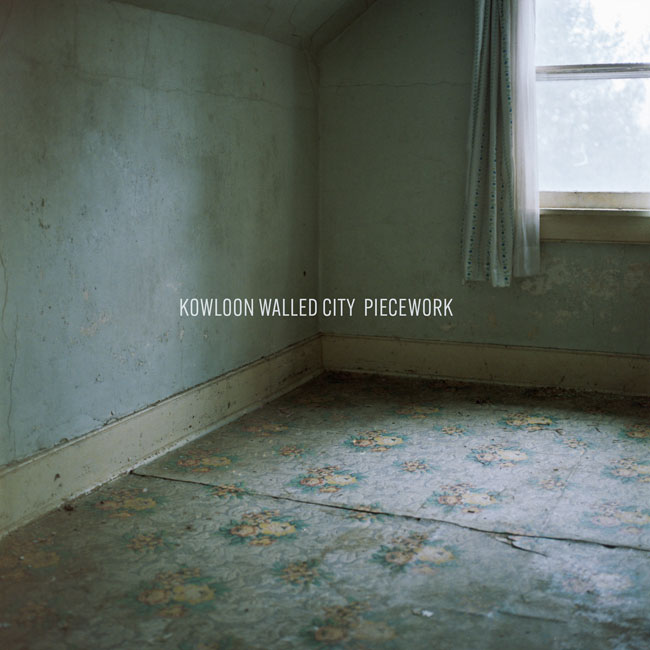
Going back to one of those ingredients, what is currently on both of your pedalboards?
Jon: Mine currently left to right is the Boss TU-2 tuner going to the Electrical Audio Experiments µ Blaster and I’m currently using it as a boost to give me gnarly gain during solos. The other I have is by Custom Audio Experiments and it’s a single knob boost.
Scott: It’s a great pedal.
Jon: It’s dark sounding, which is really nice, so it adds a little bit of flavor to the tone and then I just got the Benson Germanium Boost. Benson Amplification makes these incredible sounding amps and pedals, I think I’ve purchased every pedal he’s made because they’re all fantastic. I have this great Germanium Distortion Pedal for when we play the older Kowloon songs, and then last is the Red Panda Particle V2. It’s a cool pedal and I use it as a standard delay in Kowloon and for wacky things in other bands.
Scott: On the record I think I was using the Electrical Audio Experiments µ Blaster pedal and the Hudson Broadcast. That’s what I mainly used and occasionally I would swap in Kowloon Walled Bunny. It’s this pedal that was built for me a long time ago and I did a run of them that I built last summer during Covid. I guess you can describe it as a gnarly transparent boost, although it is an overdrive. It has a lot of tone, but it’s also very loud.
Benson Amplification makes these incredible sounding amps and pedals, I think I’ve purchased every pedal he’s made because they’re all fantastic…
I also used Big Game Pedals F800B on a few songs. That’s a clone of the preamp of the old Peavey Festival Series Solid-State Head. It’s a really cool clanking sounding pedal but it’s sort of finicky for a guitar. A few settings are really good. I think that’s it. I do have a tuner. Boss makes a cut in half TU3 that has no pedal. You can run that always on and then I have that with a kill switch after. And as Jon described earlier, if we’re feeling out of tune during a set, I can just let one note ring out and glance down to tune. Then we can keep going instead of stopping between songs and tuning which can be boring.
For me right now, True Believer has to be my favorite song, my wife as well. I’ll come home from work and hear that playing as I come in [laughs]. Is there a song or part of a song you guys are particularly proud of?
Jon: I feel like I know your answer Scott.
Scott: I want to hear Jon’s version of my answer first.
Jon: OK, I’m going to answer for Scott. The last song on Container Ships, You Don’t Have Cancer.
Scott: That is what I was going to say!
Jon: Something that we’ve been doing is the last song on the last few albums points to what we’re going to do next, You Don’t Have Cancer really pointed in the direction of what we did on Grievances. Scott mentioned that the way we write at the moment is we assemble songs together, but You Don’t Have Cancer is one I would credit 95% to Scott. Scott: I didn’t realize I wrote that much of it, but that’s a good song, when we play it live and we get to the end part I think ‘this is pretty good, good job us.’
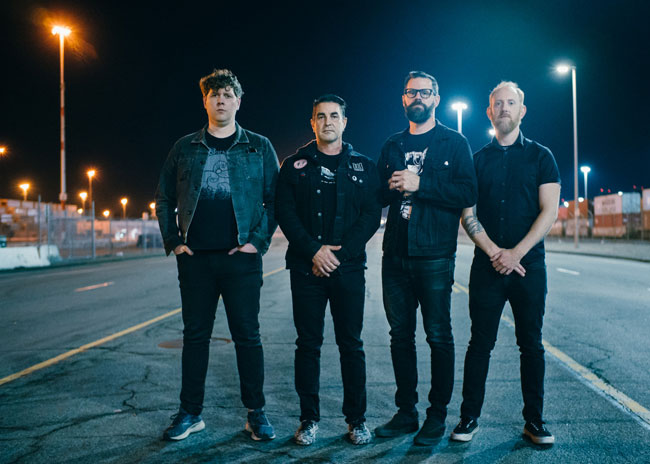
I sometimes listen to the last song of the album first because it’s usually my favorite, and that is an outstanding track [I hold up the Container Ships album], it’s why I bought it [laughs]. I love the entire album but that’s one hell of a closer. What about you Jon?
Jon: I think right now Kowloon’s been rehearsing a little bit and we’ve been able to play some of the new songs off Piecework that we haven’t been able to do that much with Covid. I’ve been really enjoying Oxygen Tent, which was released as a single prior to this album coming out. There’s a lot that happens in that song and it takes you on a little bit of a ride, even though for us it’s a fairly short song. I love playing slow songs, and every song in this band, but that one is a banger so it’s fun to play and that’s what I’m enjoying right now.
What is currently on your playlist for enjoyment?
Scott: I think we’re both listening to that new Low record a lot
I’ve seen that a lot and been meaning to check it out.
Scott: It’s one of those that you have to sit down, take the time, and listen to it uninterrupted. It’s very beautiful and incredible. I love the new Sturgill Simpson bluegrass records a lot. I think he released two over Covid with like one million songs each and there really good with flawless playing. The new Genghis Tron record is really great too. What about you Jon?
Jon: Recently I’ve been listening to all of the Tunic stuff. They are a three-piece from Canada. I don’t know if you’ve checked them out before but they’re a great high energy noisy band with a great rhythm section that reminds me of the Discord era that I love. There’s a local band in the bay area named States Of Nature that make great punk music that’s pop oriented and they’re great songs. The main thing that I got into recently are The Replacements. They have been around for a long time, and I’ve tried to like them, or figure out if I like them, for quite some time but they finally make sense to me. They put out a live album a couple of years back of them playing in New York City in 1986 and it’s just fantastic. It’s sloppy and beautiful.
I love playing slow songs, and every song in this band, but that one [Oxygen Tent] is a banger so it’s fun to play…
Is that the album that got you into them because I’m in the same boat. I’ve tried many times, but I can’t get into them, I’d like to listen to what made it click for you.
Jon: What fully made it click is actually the book Our Band Could Be Your Life, have you ever heard that or read it?
No, but I’m writing that down now.
Jon: Basically, it’s a guy who wrote about underground music. Each chapter is about an underground band from the 80s and their story from when they started, till they either broke up or broke through to the mainstream. There’s a chapter on Black Flag, Fugazi, Butthole Surfers, and more. It’s a really interesting book and I’ve actually read it a couple of times, but there’s a chapter on The Replacements. They come across as mildly entertaining humans writing about drunken bullshit rock ‘n’ roll. Based on the book, I wanted to check them out and I tried, I tried and it never clicked, and then something about this Covid year, I listened to the right song at the right moment. For you I would try that live album and listen to the song Kiss Me On The Bus.
Scott: It’s funny you mention that because it reminds me of a Ty Segall live record that I obsessed over called Deforming Lobes, but I believe Albini either mixed or recorded this one. It’s really raw, unhinged and heavy without being heavy and I’m not a Ty Segall person, I always thought he did garage rock type of stuff, but this record, the riff starts, and your jaw drops, it’s nasty.
The way you guys are describing some of these bands you listen to is how I feel about Kowloon Walled City. Thanks for the fantastic music and taking the time to discuss it with me.
Kowloon Walled City and their latest album Piecework is out now via Neurot Recordings and Gilead Media.
Label: Neurot Recordings | Gilead Media
Band Links: Official | Facebook | Bandcamp | Twitter | Instagram
Interviewed by: Josh Schneider

